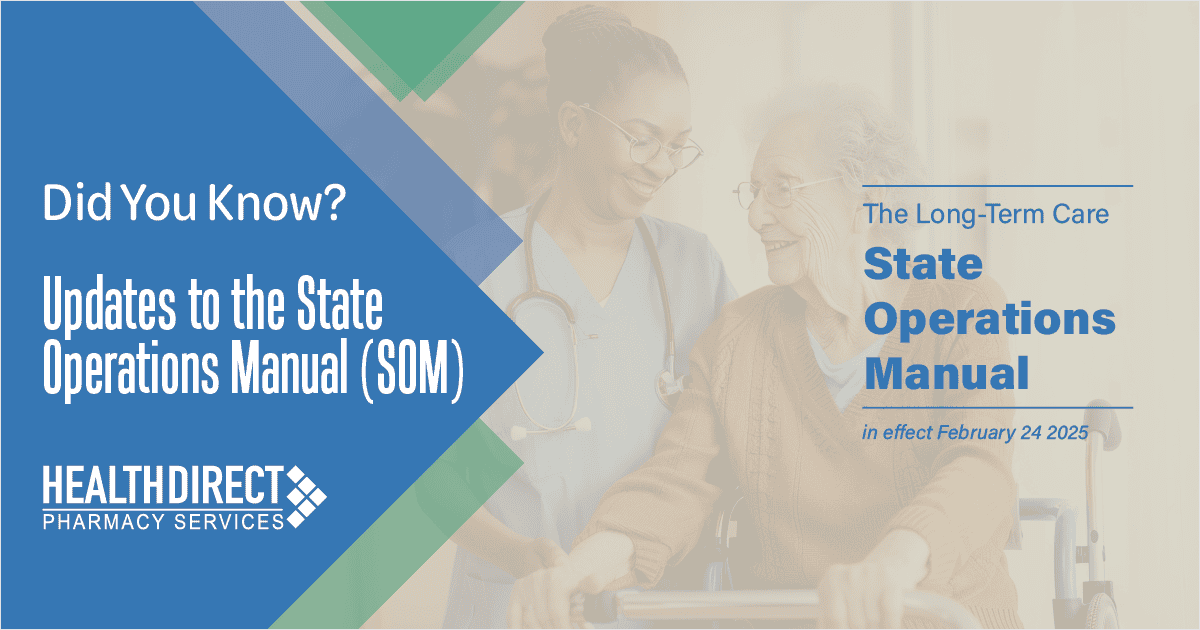in effect February 24, 2025
Revised Long-Term Care (LTC) Surveyor Guidance
On November 18th, 2024, The Centers for Medicare and Medicaid Services (CMS) issued memorandum QSO-25-07-NH, announcing extensive new guidance to surveyors throughout Appendix PP in the following topics:
- Admission, Transfer & Discharge
- Chemical Restraints/Unnecessary Psychotropic Medication
- Resident Assessment, Quality of Life and Quality of Care
- Administration, Quality Assurance Performance Improvement (QAPI)
- Pain Management, Infection Prevention and Control, and other areas
Applicable survey Critical Element Pathways have been updated to meet new guidance standards.
Revised Survey Resources will be posted on the CMS website Feb 24, 2025.
CMS has updated training resources available at their Quality, Safety, and Education Portal (QSEP)
(https://qsep.cms.gov/welcome.aspx).
For Pharmacy and medication related issues, the new guidance language appears primarily under three F-tags:
- F605: Physical and Chemical Restraints
- F658: Comprehensive Care Plans (as they relate to diagnosing Schizophrenia)
- F841: Medical Director
This article will focus on compliance at F605 – Physical and Chemical Restraints which addresses use of psychotropic drugs in the nursing home setting.
The regulations and guidance for the unnecessary use of psychotropics (F758) have been incorporated into F605 Physical and Chemical Restraints.
To ensure compliance, skilled nursing facilities must:
Ensure that the resident is free from chemical restraints imposed for purposes of discipline or convenience and that are not required to treat the resident’s medical symptoms.
- To keep residents free from chemical restraints used for discipline or convenience and that are not required to treat the resident’s medical symptoms, the facility must prevent the unnecessary use of psychotropic medications.
- Residents must only remain on psychotropic medications when gradual dose reductions and behavioral interventions have been attempted and/or deemed clinically contraindicated.
Psychotropic Drug Definition
Includes but is not limited to:
- Antipsychotics
- Antidepressants
- Anxiolytics
- Sedatives / Hypnotics

Regulations apply to additional medication classes when their documented use appears to be a substitution for another psychotropic medication rather than for the original or approved indication.
Categories of medications which affect brain activity may include antihistamines, anti-cholinergic medications and central nervous system agents used to treat conditions such as seizures, mood disorders, pseudobulbar affect, and muscle spasms or stiffness.
Prior to initiating or increasing psychotropic drug therapy for a resident
- The use of non-pharmacological approaches must be attempted, unless clinically contraindicated, to minimize the need for psychotropic medications, use the lowest possible dose, or discontinue the medications.
- Medical record documentation must demonstrate approaches attempted and related outcomes
- Additionally, the facility should ensure that the resident’s behaviors (expressions or indications of distress), which may have prompted the initiation or change in a psychotropic medication, are not:
- Upsetting to the resident or a safety concern to the resident or others;
- Due to a medical condition or problem that can be expected to improve or resolve as the underlying condition is treated or the offending medication(s) are discontinued;
- Due to environmental stressors alone that can be modified prior to initiating medication
- Due to psychological stressors alone (e.g., loneliness, taunting, abuse)
- Prior to initiating or increasing a psychotropic medication, the resident, family, and/or resident representative must be informed of the benefits, risks, and alternatives for the medication, including any black box warnings for antipsychotic medications, in advance of such initiation or increase.
- The resident has the right to accept or decline the initiation or increase of a psychotropic medication.
- To demonstrate compliance, the resident’s medical record must include documentation that the resident or resident representative was informed in advance of the risks and benefits of the proposed care, the treatment alternatives or other options and was able to choose the option he or she preferred.
Compliance with F605 – Gradual Dose Reduction (GDR) Requirement
‘Gradual Dose Reduction (GDR)’ refers to the stepwise tapering of a dose to determine if symptoms, conditions, or risks can be managed by a lower dose or if the dose or medication can be discontinued.
- For any resident who is receiving a psychotropic medication, the facility must show evidence that a GDR has been attempted unless clinically contraindicated.
- Compliance with the requirement to perform a GDR may be met if, for example, within the first year in which a resident is admitted on a psychotropic medication or after the prescribing practitioner has initiated a psychotropic medication, a facility attempts a GDR in two separate quarters (with at least one
month between the attempts), unless clinically contraindicated.
The consideration of GDR must be documented for ALL psychotropics, regardless of the underlying indication for use.
For any individual who is receiving a psychotropic medication, a GDR may be considered clinically contraindicated for reasons that include, but that are not limited to, the following:
- The continued use is in accordance with relevant current standards of practice and the physician has documented the clinical rationale for why any attempted dose reduction would be likely to impair the resident’s function or exacerbate an underlying medical or psychiatric disorder; or
- The resident’s target symptoms returned or worsened after the most recent attempt at a GDR within the facility and the physician has documented the clinical rationale for why resident’s function, exacerbate an underlying medical or psychiatric disorder or increased distressed behavior.
GDR Documentation Requirements
- Medical record documentation should reflect the date of the GDR attempt, the outcome of the dose reduction attempt, and the plan regarding future GDR attempts.
- Physician documentation should contain the rationale for why GDR attempts are clinically contraindicated for the resident.
Monitoring for Adverse Consequences
Monitoring and accurate documentation of the resident’s response to any treatment (such as, lab results, vital signs, progress notes, behavior flow sheets, medication administration records and the consultant pharmacist’s drug regimen review) is essential to evaluate the ongoing effectiveness, benefits as well as risks of nonpharmacological approaches and psychotropic medications.
A psychotropic medication used for staff convenience or to discipline and is not required to treat medical symptoms, may cause:
- Sedation, such as sleeping during hours that he/she would not ordinarily sleep;
- Withdrawal from activities and socializing;
- Loss of autonomy and dignity;
- Confusion, cognitive decline, and depression;
- Weight loss, decline in skin integrity, or continence level; and/or
- Decline in physical functioning including an increased dependence in activities of daily living.
References:
- CMS. Ref: QSO-25-07-NH Revised Long-Term Care (LTC) Surveyor Guidance: Significant revisions to enhance quality and oversight of the LTC survey process. Published November 18, 2024




